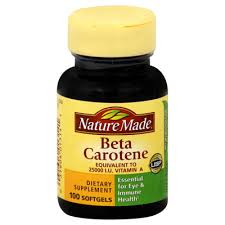Today’s
blog is going to focus on natural medicine. This is a topic that I find very
important, but I don’t think that the general population is educated enough
about it. I hear from many patients that they are taking something herbal for
their memory, energy level, or fertility. Their rationalization is that it’s
natural, so it can’t be bad for them. Arsenic is natural. Just because
something is a natural product or herb doesn’t mean that it’s safe and good for
you. This blog will go over how to get information on natural and herbal
products that is credible, accurate, and complete.
Natural
products and herbs are not regulated by the FDA. This is what makes selecting a
product so hard. You might notice that on the back of the box or bottle of a
natural product, it states what it is intended to do. “Promotes heart health”
or “increases energy” are common statements. However, each of these statements
is always followed by an asterisk, which correlates to a statement near the
bottom of the box in small print that says “These claims have not been
substantiated by the FDA.” Companies that make natural products are allowed to
state that their product “supports the structure and function of the body, but
can’t claim to diagnose, treat, cure, or prevent any disease. Their
manufacturing plants also aren’t regulated, so it’s hard to tell if they use
good manufacturing processes or if they monitor how much of the natural product
goes into each dosage form. Some companies choose to go through a process to gain
certification from the USP Dietary Supplement Verification Program. This is
voluntary, but it ensures the quality of the product. USP Verified products
contain the ingredients listed on the label in the listed strength, do not
contain levels of contaminants that could be harmful, and are made according to
the FDA’s good manufacturing processes. These products have a stamp on them to
show that they are quality. See the end of the blog for a sample stamp.
The
biggest issues with natural products are of quality, safety, and efficacy. The
composition of the products can vary between different manufacturers, and even
between different lots from the same manufacturer. It’s also hard to tell if
what’s in the bottle is what it says it is. Contaminants are another concern.
Are there pesticides, metals, or other organisms in the product? Side effects
and interactions aren’t written on the bottle, and people seldom ask a pharmacist
if it is safe to take with their medications. There aren’t many studies on
these products, and use of these can sometimes delay important medical
procedures.
So
where does one look for information on natural products? Usually it’s a family
member, a friend, or Google. Getting information from a family member can be
dangerous because they might not have all the important information about the
product. Also, the things that were used routinely when grandma was younger but
aren’t used anymore aren’t used for a reason. We found them unsafe,
ineffective, or less effective than another treatment that is used now.
Information coming from a friend is often going to be one-sided and biased,
because your friend has an opinion on the product. Whether he/she thinks it’s a
great product or an awful product, it’s based on experience and subjective
information, not on evidence. Google is full of even more old, biased,
opinionated “facts” on herbal and natural products, so it can’t be any more
trusted than the first two sources. There are, however, good sources to find
information.
Natural
Standard is a company that was founded to provide accurate and complete
evidence-based information for health care practitioners and patients. It is a
very comprehensive source for all natural products and alternative medicine
therapies. The information included is peer-reviewed and evidence-based. They
have different monographs for different levels of information. There are
monographs for professionals that include all the information in scientific
terms, and then there are monographs in easier-to-understand language that also
include all the information. This allows patients to get information they can
understand and know that they have all the information available. The
monographs include information on effectiveness, side effects, drug
interactions, dosing, use in pregnancy and breastfeeding, historic background,
and safety. This encompasses all of the information you would need to know.
Natural
Standard has five different databases to help search for information: Herbs
& Supplements, Condition Center, Alternative Modalities, Dictionary, and
Patient Information. In Patient Information, the database includes background,
evidence, usage, dosing, safety, and interactions, as well as the monographs
listed above. You can search by condition if there is something you are looking
to treat, and the site offers all therapy options ranging from pharmaceutical
to natural products to alternative medicine such as acupuncture. This site is
definitely comprehensive in including all necessary information.
If you are using or planning to
use natural products, it is essential for you to get all of the information on
the specific product you are considering. It is also important to ask your
pharmacist if you can take it while you are on your other medications, even if
the other medicines you take are not prescriptions. To get more information,
there are databases online that can help provide complete and accurate
information for patients. Naturalstandard.com is one of those sites. Please be
safe when selecting therapies and always do your research!
Alexis Ireland, PharmD Candidate 2014
FDA.
www.fda.gov/Food/DietarySupplements.
Mani, Nandita MLIS. Natural Standard. J Med Libr Assoc. 2005
October; 93(4): 507–509.
Natural Standard. www.naturalstandard.com
U.S. Pharmacopeia.
www.usp.org/USPVerified.


No comments:
Post a Comment